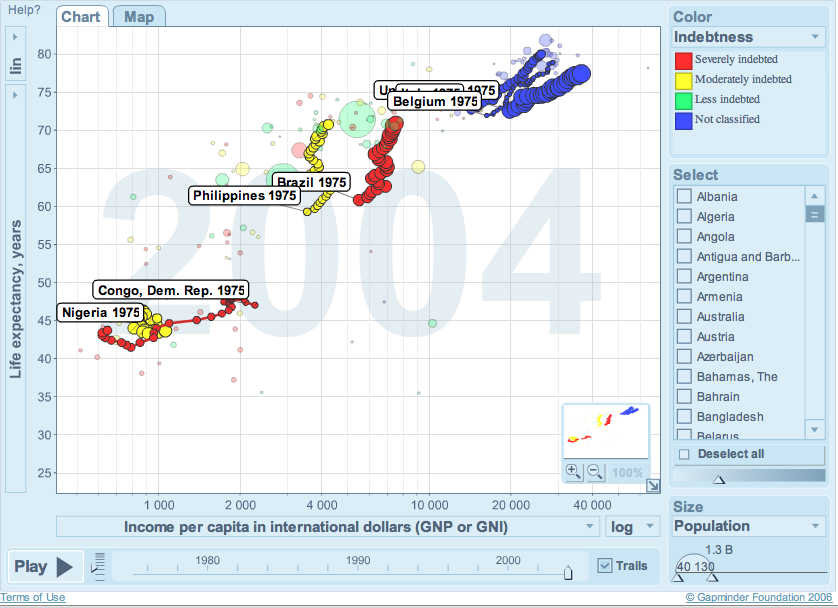Net toen ik dacht mijn Gmail account het overgrote deel van de spam uit mijn inbox wist te filteren, net op dat moment stortte er een lawine aan Facebook-MySpace-LinkedIn-Plaxo-Spock mails over mij neer. En nog erger, daarvan was niets 'spam' volgens de gangbare definitie. Want al die mails werden geïnitieerd door mensen die ik in meer of mindere mate ken. Nu, als ik even wat dieper graaf in het wie en waarom van al die mails dan stel ik vast dat bij het begin van iedere golf het een relatief kleine groep geeks is die ook op dat nieuwe platform opnieuw met mij willen linken. En ik speel het spel gewillig mee want ik wil ook wel eens zien wat er nu weer uitgevreten wordt met het geld van gewillige venture capitalists.
Maar wat doet de doorsnee gebruiker hier allemaal mee? Wanneer weet die of het de moeite is om andermaal al die persoonlijke gegevens toe te vertrouwen aan een zogenaamd veilige database? Wel, ik denk dat ik een mogelijke sleutel gevonden heb.
Als we teruggaan naar de bestaansreden van sociale netwerken (online of gewoon in de echte wereld) dan komt dat steeds neer op een gezamlijke interessepunt. Iets waar mensen graag samen over praten, stoefen, ideeën uitwisselen, etc. Een fijne avond op café is er eentje waarbij je iemand ontmoet met raakpunten, gelijkaardige interesses. En in de virtuele sociale netwerken is dat niet anders. Hugh MacLeod noemt die gespreksonderwerpen "Social Objects", en stelt daarbij dat sociale netwerken ontstaan rond social objects en niet andersom. Fundamenteel heeft hij daar een punt, maar zoals steeds is de realiteit complexer.
Vandaag bevinden we ons nog in een fase waarin online sociale netwerken in hun kinderschoenen staan. We zijn nog volop aan het experimenten hoever we kunnen gaan in privacy, welke features werken en welke niet, hoe we zo'n netwerk kunnen rendabiliseren. En het zijn die platformen die de totnogtoe beste mix van die elementen bij elkaar krijgen die succesvol zijn en voldoende kritische massa bij elkaar krijgen om langer dan een paar maand te overleven. Dus we zijn nog een paar jaar gedoemd om te leven met platformen die groeien op basis van hun nieuwigheid, coole features en een stevig marketing budget. Eens er voldoende leden zijn ontstaan de conversaties vanzelf, en ontstaan er echte sociale netwerken.
Met die wijsheid in ons achterhoofd is er een relatief éénvoudig eikpunt waar tamelijk zinloze platformen transformeren in echte sociale netwerken. Dat kantelpunt kan je identificeren aan de hand van de onderwerpen waarover gepraat wordt. Bij de start is het onderwerp van discussie (het social object) het platform zelf. Dit omdat de leden bestaan uit early adopters en geeks die vooral bezig zijn met de nieuwigheid. Zodra echter de conversaties significant omslaan in de richting van échte conversaties, op dat moment krijgt het platform een toekomst.
De praktijk bewijst ook dat deze regel klopt. Hoewel Facebook vandaag door iedereen gebruikt kan worden is dit platform groot geworden als een sociaal netwerk voor studenten, een electronische vervanger van het jaarboek met foto's van medestudenten. MySpace daarintegen is in de eerste plaats gelanceerd als platform en is echt doorgebroken bij het grote publiek toen het een ideaal platform bleek om fans te verzamelen rond muziekgroepen.
Dus, als je geen zin hebt om in het zoveelste sociaal netwerk te stappen, check dan even waarover de conversaties gaan. Als die jou kunnen bekoren dan heb je misschien een leuke plek ontdekt om nieuwe vrienden te maken.





